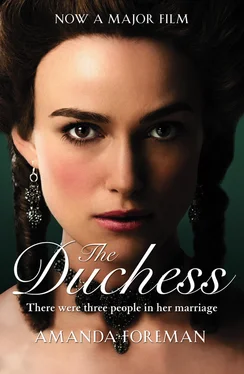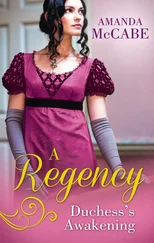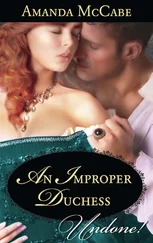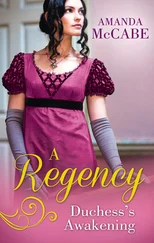Lord and Lady Spencer were shattered by the loss. ‘You know the perhaps uncommon tenderness I have for my children,’ Lady Spencer explained to her friend Thea Cowper. Three years later, in 1769, Charlotte was still very much in her heart when she had another daughter, whom they called Louise. But she too died after only a few weeks. After this the Spencers travelled obsessively, sometimes with and sometimes without the children, never spending more than a few months in England at a stretch. Seeking an answer for their ‘heavy affliction’, they turned to religion for comfort and Lady Spencer began to show the first signs of the religious fanaticism which later overshadowed her life.
At night, however, religion was far from their thoughts as they sought distraction in more worldly pursuits. They set up gaming tables at Spencer House and Althorp and played incessantly with their friends until the small hours. Lady Spencer tried to control herself: ‘Played at billiards and bowls and cards all evening and a part of the night,’ she wrote in her diary. ‘Enable me O God to persevere in my endeavour to conquer this habit as far as it is a vice,’ she prayed on another occasion. 29 The more hours she spent at the gambling table, the more she punished herself with acts of self-denial. By the time Georgiana was old enough to be conscious of her mother’s routine, Lady Spencer had tied herself to a harsh regimen: up at 5.30 every morning, prayers for an hour, the Bible for a further hour, followed by a meagre breakfast at nine, and then household duties and good works until dinner. But in her heart she knew that her actions contained more show than feeling. ‘I know,’ she wrote, ‘that there is a mixture of Vanity and false humility about me that is detestable.’ 30 However, knowledge of her faults did not change her ways. Twenty years later a friend complained: ‘She is toujours Lady Spencer, Vanity and bragging will not leave her, she lugg’d in by the head and shoulders that she had been at Windsor.’ 31
The children were silent witnesses to their parents’ troubled life. Sometimes Georgiana and Harriet would creep downstairs to watch the noisy scenes taking place around the gaming table. ‘I staid till one hour past twelve, but mama remained till six next morning,’ Harriet wrote in her diary. 32 When the children were older they were allowed to participate. Harriet recorded on a trip to Paris: ‘A man came today to papa to teach him how he might always win at Pharo, and talked of it as a certainty, telling all his rules, and when papa told him he always lost himself, the man assur’d him it was for want of money and patience, for that his secret was infallible. Everybody has given him something to play for them, and papa gave him a louis d’or for my sister and me.’ 33
Georgiana reacted to the loss of Charlotte and Louise by worrying excessively about her two younger siblings. She also became highly sensitive to criticism and the smallest remonstrance produced hysterical screams and protracted crying. Lady Spencer tried many different experiments to calm Georgiana, forcing her to spend hours in prayer and confining her to her room – to little effect. 34 It was in her nature to oversee every aspect of a project, and from this time forward Lady Spencer left nothing in Georgiana’s development to chance. Even her thoughts were subject to scrutiny. ‘Pray sincerely to God,’ Lady Spencer ordered her, ‘that he would for Jesus Christ’s sake give his assistance without which you must not hope to do anything.’ 35
When she reached adolescence Georgiana’s tendency to over-react became less marked, but not enough to allay her mother’s fear for her future happiness. In November 1769 both George and Harriet were dangerously ill and Lady Spencer confided to a friend that the twelve-year-old Georgiana had shown ‘upon this as upon every other occasion such a charming sensibility that it is impossible not to be pleased with it, tho’ when I reflect upon it I assure you it gives me concern as I know by painful experience how much such a disposition will make her suffer hereafter.’ 36
Georgiana was only fourteen when people began to speculate on her choice of husband. Lady Spencer thought it would be a dreadful mistake if she married too young. ‘I hope not to part with her till 18 at the soonest,’ she told a friend in 1771. 37 Her daughter’s outward sophistication led many to think that she was more mature than her years. In 1772 the family embarked upon another grand tour, this time with all three children in tow. The rapturous reception which greeted Georgiana in Paris confirmed Lady Spencer’s fears. According to a fellow English traveller, ‘Lady Georgiana Spencer has been very highly admired. She has, I believe, an exceedingly good disposition of her own, and is happy in an education which it is to be hoped will counteract any ill effect from what may too naturally turn her head.’ 38
Georgiana combined a perfect mastery of etiquette with a mischievous grace and ease which met with approval in the artificial and mannered atmosphere of the French court. Wherever Georgiana accompanied Lady Spencer people marvelled at the way in which she seemed so natural and yet also conscious of being on show. Many were daunted by the complex and highly choreographed set-pieces which passed for social discourse in French salons. ‘It was no ordinary science,’ reminisced a retired courtier, ‘to know how to enter with grace and assurance a salon where thirty men and women were seated in a circle round the fire, to penetrate this circle while bowing slightly to everyone, to advance straight to the mistress of the house, and to retire with honour, without clumsily disarranging one’s fine clothes, lace ruffles, [and] head-dress of thirty-six curls powdered like rime …’ 39
The family travelled around France for a few months and then moved on to Spa in the summer of 1773, where Georgiana celebrated her sixteenth birthday. They found many friends already there, including the twenty-four-year-old Duke of Devonshire. His family had always been regular visitors: it was at Spa that his father the fourth Duke had died in 1764 aged forty-four, worn out after his short but harrowing stint as Prime Minister in 1756. * The Devonshires ranked among the first families of England and commanded a special place in British history. They had been involved in politics since the reign of Henry VIII, when Sir William Cavendish oversaw the dissolution of the monasteries. Sir William was the second husband of four to the redoubtable Bess of Hardwick, the richest woman in England after Elizabeth I and the most prolific builder of her age. He was the only one whom she married for love, and when she died all her accumulated wealth went to her Cavendish sons. The eldest, William, used his mother’s fortune to purchase the earldom of Devonshire from James I for £10,000. His descendants followed his example and devoted their lives to increasing the family’s wealth and power.
Seventy years later, on 30 June 1688, the fourth Earl of Devonshire joined with six other parliamentary notables (‘the Immortal Seven’) and issued a secret invitation to William of Orange to come to England and take the throne from the Catholic James II. When William arrived the Earl personally toured the Midlands with his own militia and subdued the countryside around Derbyshire and Cheshire. He received a dukedom for his bravery, as did several of his Whig colleagues. It was not bigotry which had prompted the first Duke to act but political idealism; he, along with many other Whigs, had suspected King James of plotting to reduce the power of parliament in order to establish an absolutist monarchy, similar to that enjoyed by his cousin Louis XIV in France. William’s acceptance of their offer of the crown, as well as the conditions imposed by parliament, resulted in the establishment of the Revolution Settlement. This guaranteed the sovereignty of parliament over a constitutional monarchy, and restricted the succession to royal members of the Protestant faith. Subsequent generations of Whigs revered the 1688 revolutionaries as the guardians of English liberty. They looked to the descendants of the Immortal Seven to maintain the Whig party and to keep its ideals alive.
Читать дальше












